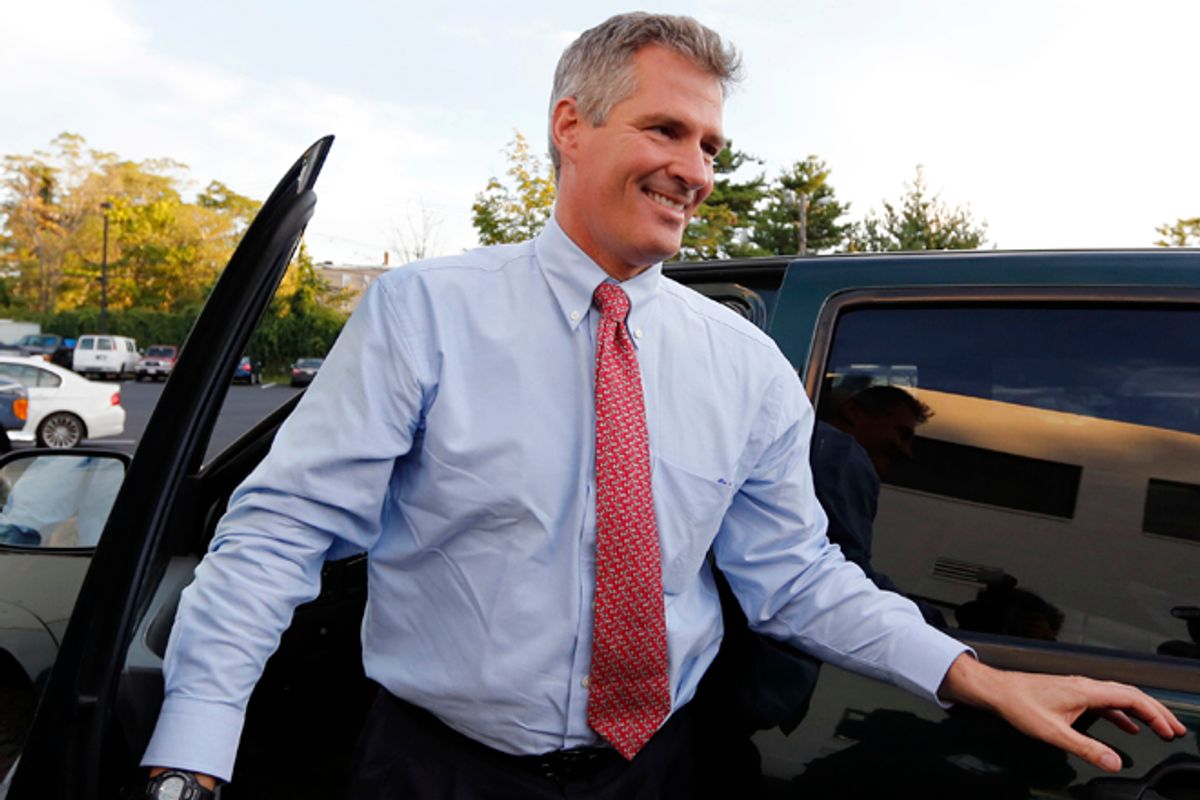The political world is eagerly anticipating this Wednesday’s presidential debate, but first comes another crucial showdown: Tonight’s second televised encounter between Scott Brown and Elizabeth Warren.
The Massachusetts Senate race remains close, but the candidates have switched places in the past month, with Warren opening small leads in most polls conducted since the Democratic convention. Two surveys released in the past 24 hours confirm her sustained momentum, with a Boston Globe/University of New Hampshire survey putting her ahead 43-38 percent and a WBUR/MassINC poll giving her a 49-45 edge.
Warren was never getting blown away in this race, but Democrats began worrying over the summer when Brown pushed into the lead. Warren’s resurgence seems to owe itself to two factors.
One is a spike in enthusiasm among Democrats and Democratic-leaning voters that was apparently triggered by the party’s Charlotte convention. In Massachusetts, President Obama is now crushing Mitt Romney, by 27 points in the Globe’s poll and 28 in WBUR’s. As I’ve written, the limit of how much Romney can lose the state by without creating a top-of-the-ticket effect that ruins Brown’s chances is probably between 25 and 30 points. Brown is coming up against that ceiling now.
The other factor is the relative likability of both candidates. Warren’s challenge has never been to become more personally popular than Brown. What she’s needed to do is meet a basic threshold – well-liked enough that swing voters don’t use personal appeal as the basis for their decision and instead consider the candidates’ party label. She seems fairly well-positioned on this front too. The Globe poll shows a virtual wash when it comes to each candidate’s favorable/unfavorable score; Brown’s is 53/33 percent and Warren’s is 53/36. (Asked which candidate is more likable, though, voters choose Brown by a 58-27 percent margin.) WBUR shows a slight gap, with Brown’s rating at 52/33 and Warren’s at 47/37.
This raises a question for Brown, who attacked Warren with unexpected aggression in their first debate two weeks ago: Is it time to junk the negativity – particularly on the matter of Warren’s Native American ancestry?
After all, there’s no sign in the new data that his assault on Warren has pushed voters away from her. But by going after her with such intensity, he has opened himself up to criticism that he’s not focusing on the issues that really matter to voters (a theme that Warren pressed in a recent ad). Brown also risks tarnishing what is his chief political asset in a state that’s normally hostile to anyone from his party: his personal popularity. This is especially true after a video surfaced last week showing a Brown staffer and other Republican campaign workers mocking Warren with crudely stereotypical Native American chants. Brown initially refused to offer an apology, but after a few days of pressure did release a statement calling the conduct in the video “unacceptable.”
There are both short- and long-term considerations for Brown as he enters the final month of this race. Certainly, this election remains very winnable for him. But if he continues attacking Warren aggressively and it brings down his own image, it could end up working to her advantage; in a race between two unliked candidates, Massachusetts would presumably err on the side of the Democrat.
The longer-term consideration involves what Brown does if he loses to Warren. Right now, because of his likability, he’d be well-positioned for a comeback two years from now, when the Bay State’s governorship will be open. (Democratic Gov. Deval Patrick has already ruled out seeking a third term.) The Republican label doesn’t hurt Massachusetts candidates nearly as much in gubernatorial contests as it does in federal races, something that Bill Weld, Paul Cellucci and Mitt Romney can all attest to. With his popularity and moderate image, Brown would be an ideal GOP nominee for the governorship.
But that could change if he emerges from this campaign with a reputation for personal attack politics. The Globe poll also tested the images of several Democrats eyeing the governorship, and one jumps right out: Martha Coakley, whom national political observers are still mocking for her 2010 Senate loss to Brown, has quietly repaired her image and is now more popular than Brown – a 54/26 percent favorable/unfavorable score. Less well-known is Steve Grossman, the state treasurer, who is also interested in running and who clocks in at 22/7 percent. Tim Murray, whose stint as Patrick’s lieutenant governor has been personally tumultuous, is at just 25/28 percent.
The harder he goes after Warren, the more Brown risks losing not just this race, but also the next one on the calendar.



Shares